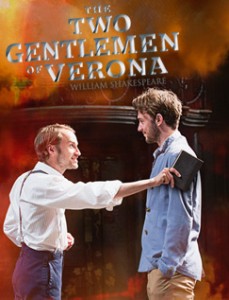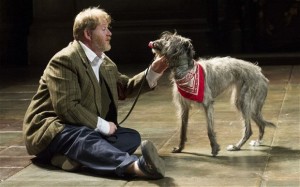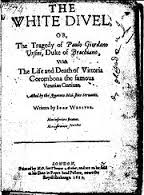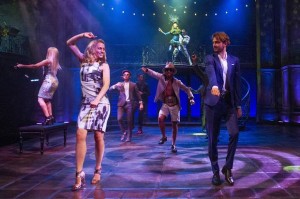Monday was Two Gentlemen of Verona at the Royal Shakespeare Theater.
 During the interval, Andy Kesson, whom some suspect to be obsessed with a certain Elizabethan playwright, mentioned to me that some critics think Two Gents is early Shakespeare imitating Lyly, and he didn’t think that was right. That got me thinking about the play’s dizzying turns of loyalty, rhetoric, and generic identity, which the RSC actors were struggling so valiantly to clarify for the audience. Not exactly Lyly, I thought. More like Robert Greene.
During the interval, Andy Kesson, whom some suspect to be obsessed with a certain Elizabethan playwright, mentioned to me that some critics think Two Gents is early Shakespeare imitating Lyly, and he didn’t think that was right. That got me thinking about the play’s dizzying turns of loyalty, rhetoric, and generic identity, which the RSC actors were struggling so valiantly to clarify for the audience. Not exactly Lyly, I thought. More like Robert Greene.
Perhaps I’m just going to my own go-to Elizabethan also-ran, and I do have a tendency to see more Greene in early and late Shakespeare than many others do. But there’s something Greene-ish about the play’s mix of extreme melodrama — bandits! exile! kidnapping! attempted rape! — with rhetorical play and emotional opacity. The pay-off for Greene-lovers like me is a heightened attention to and awareness of rhetorical forms and generic flexibility. This linguistic density works against theatrical realism — and against the RSC’s house style — but produces a particularly literary effect. It’s twisty-turny, but I like it.
The question of this production for me, though, was wether the RSC’s passion for legibility could find a happy home in this uneven play. Maybe not — but I think the better answer in this case is, almost. When a cast has to work as hard as this one did to make the plot- and erotic-turns legible, it’s hard for them to do anything else.
The clowns were the best and most straightforward part of the play, esp Martin Bassindale as Speed and Roger Morlidge as Launce. As comic counterpoints, they played in a calm space beneath the turmoil of the love plots, and their clarity was welcome. Mossup as Crab the Dog stole the show with his keening whines, perfectly on cue. I also like Sarah MacRae’s Sylvia, in part because she was the prototypical Greene heroine: powerful, stable, physically passive, and rhetorically persuasive. As in Greene’s romances, she converts the wayward Valentine through sheer endurance. The play gains some emotional purchase when she arrives; she was a still point around which Proteus and Valentine circled.
The perfect clarity of the RSC almost reached the family who sat next to me in the second deck. The dutiful mother seemed worried about her antsy 10-year old, who was not drawn into the show. But the magic worked on the older daughter, who leaned over the rail to catch every twist of the lovers’ words. Not for the first time, I was reminded that these productions are not just for us professors.
Tuesday was The White Devil at the Swan.
 We were all excited to see this seldom-performed Webster play, which many of us (including me) had never seen before. I was perfectly happy to forgive the faux-Baz Luhrmann-meets-Lady Gaga set, but, really, if they were going to do a disco scene — shouldn’t they be better dancers?
We were all excited to see this seldom-performed Webster play, which many of us (including me) had never seen before. I was perfectly happy to forgive the faux-Baz Luhrmann-meets-Lady Gaga set, but, really, if they were going to do a disco scene — shouldn’t they be better dancers?
The play is fiendishly intricate and impressively violent, with graphic poisonings, one administered through masks worn by wrestlers, killings, mostly mute but bloody ghosts, and one spectacular coup d’theatre involving pistols that turn out not to be loaded. (This elaborate stage business is the triumph of the play, with the playwright manipulating a whole extended scene for Flaminio’s great line, after getting up from playing dead, “The pistols were not loaded!” Middleton never thought of that, crows Webster!)
Like Two Gents, it’s an exposition-heavy play, though what gets described could not be more different: lust and violence replace love and naivete. As with the previous night’s play, though, I could not help feeling that the production was running as fast as it could to stay in place, to communicate the story, to make sure we were all following each turn and tangle. I was looking for a clearer vision.
The production might have been better off, esp in the long, bloody second half of the show, cutting the text in order to focus the action. It’s hard to make sense of the Jacobean taste for ultra-violent revenge tragedies set in 16c Italy, and some parts of the anti-Catholic satire may be lost on a 21c audience. When I’ve seen productions of these plays that I’ve really enjoyed — the best one was Red Bull’s incandescent Women Beware Women in New York in 2008 — they played the gore as high-spirited pastiche, a kind of brutal, emotionally raw joy. Maybe it was the bad dancing — but this was not a joyous production.
Kristy Bushell as Vittoria was great, especially during the trial scene, where she powerfully faced down the corrupt Cardinal who was both her judge and her accuser. She played a semi-powerful heroine, partly trapped in webs of corruption, partly negotiating those perils. Casting Flaminio, her brother who arranges her first assignation with Bracciano and later performs assorted murders and intrigues, as a woman, Laura Elphinstone, was interesting but not fully developed: the masculine form of the name Flaminio was kept and no one could figure out any real conceptual reason for the casting switch. (I thought maybe it had to do with the 3 non-Shakespearean plays being pre-feminist “roaring girl” plays — but surely the powerful woman in the White Devil is Vittoria, who matches Moll Cutpurse and Alice Arden in Roaring Girl and Arden of Faversham?)
As with Two Gents, I am not sure the RSC house style worked for such a baroque death-nest of a play. So much energy was spent unravelling the plot that it was hard to do much else. Francisco, the eventually triumphant conspirator whose sister had been married to Bracciano, was played by one of my favorite actors, Simon Scardifeld, who played Hermione and Kate the Shrew in two of Propellor’s great all-male productions — and even though I knew he would be there, I barely noticed him.
For this show, I sat, again on the 2nd tier, with two English tourists who were eager to see something new. I’m not sure Webster quite won them over.
Tonight and Friday: 2 Henry IV, and the Roaring Girl!

[…] set a high bar for the less constant human lovers. Having Crab played by a human actor, unlike the trained pooch I saw in Stratford last summer, focused this idealistic mirror. Are Launce and Crab the most devoted couple in all of […]